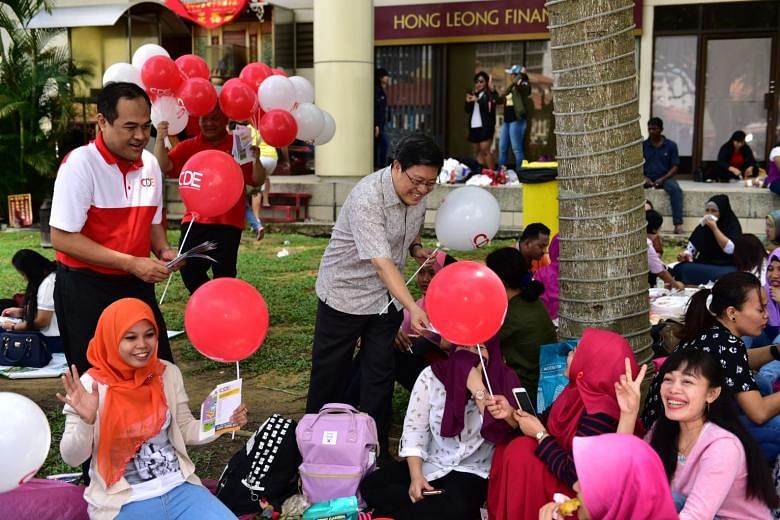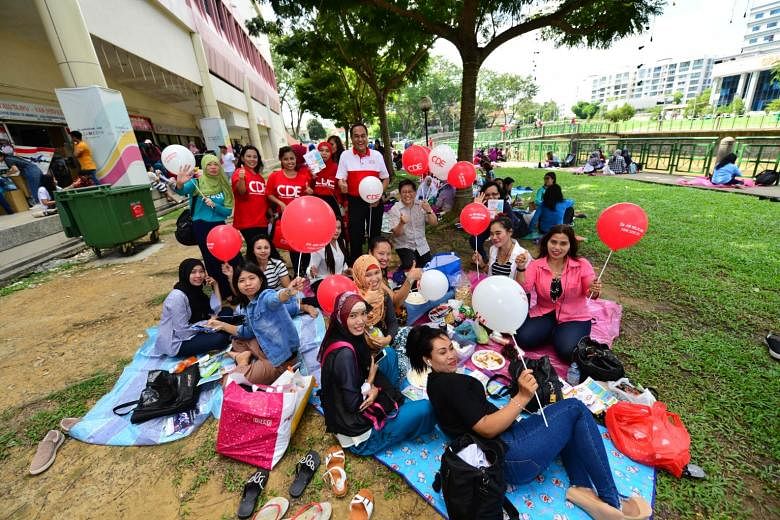SINGAPORE - An Indonesian maid was experiencing depression and had morbid thoughts when she picked up the phone one day last year to call her friend Rusmawati.
After the call, Ms Rusmawati, who is also a domestic worker from Indonesia, made a decision that may have saved her friend's life.
She alerted the Centre for Domestic Employees (CDE).
CDE and the police quickly got in touch with her friend, averting a tragedy. Today, the woman is doing better, and gets regular counselling from CDE - a voluntary welfare organisation here that looks after foreign domestic workers' (FDWs) interests.
At CDE's second anniversary celebrations on Sunday (Jan 21), this and other stories were recounted, as the centre announced plans to double its maid shelter capacity and roll out a skills certification course.
The centre's latest Social Report Card showed a rise in the number of cases of maids needing help. CDE provided shelter to 141 FDWs in 2017, up from 110 in 2016. To cope with rising demand, CDE is doubling its shelter capacity to 200 spaces this year.
Said CDE chairman Yeo Guat Kwang: "We have to. Based on the trend, the number of cases has increased. We need to quickly get a place to shelter more maids."
The increase in shelter capacity comes as the number of salary disputes remains high. Many maids seek shelter from CDE while their disputes are undergoing resolution.
CDE recorded 607 cases of help rendered in 2017, up from 517 the year before. Of these, salary disputes were the most common issue raised.
Since its inception in 2016, CDE has clawed back $113,668 from employers - including $52,543 last year. This was from employers who failed to pay their maids, or kept their salaries for "safekeeping".
Assuming an average salary of $600 per maid, this represents nearly 190 unpaid monthly wages for maids here since 2016. The numbers are staggering, but Mr Yeo said there are still more cases that go unreported or cannot be resolved due to the employers' inability to pay up.
He added: "We have to educate FDWs to report salary problems and come to us early. We have seen a number of cases where the employer owed them too much.
"By the time we are aware and are trying to help them recover the salaries, the employers may already be in financial difficulty."
In one case, the amount owed to a maid totalled $15,000, which was successfully recovered after CDE's intervention.
Mr Yeo said more public education needs to be done to boost workers' understanding of their rights, and to allay any fears they may have of coming forward.
"Many maids do not know that there is a scheme to allow them to change employers if they face a salary dispute. As the case is being resolved, CDE will be able to provide all assistance, including lodging," said Mr Yeo.
CDE hopes to also offer training and certification programmes during the maids' stay at CDE shelters.
Towards this end, it is working with training partners SkillsFuture Singapore and the NTUC Learning Hub. CDE has completed its "first-cut" of a skills assessment curriculum, with more details to be shared soon, a spokesman said.
The next step is to work towards implementing the new curriculum with training partners.
At the same time, CDE is advocating that more employers rely on e-payment, rather than cash, to pay their maids' salaries, in order to minimise disputes.
A CDE survey last year found that 60 per cent of FDW respondents were open to utilising bundled electronic bank services to receive salaries or to remit money home. FDWs from Myanmar were the most open, followed by those from the Philippines, then Indonesia.
As at mid-December last year, 1,913 applications have been submitted to POSB to open special payroll accounts for FDWs, which CDE helped establish.
"We are also calling on the Government to make safekeeping of FDWs' salaries by employers illegal," said Mr Yeo, noting that this is a common cause of unnecessary misunderstanding and disputes.
While these efforts are under way, maids here told The Straits Times that they are aware of the various avenues of help, and where they can find a listening ear to their problems.
If Ms Rusmawati had received her friend's call more than 15 years ago, when she first arrived in Singapore from East Java to work, she would not have known what to do.
It was her voluntary work with CDE over the past 18 months that exposed her to more information about organisations and laws here that protect FDWs.
"When I first came, I could not go out with friends, call them on the phone or take a rest day. Now, because of CDE, I know more," said the 36-year-old.
CDE has five locations around the island, including at City Plaza and Peninsula Plaza, where its site offices are located. Talks are under way to open a third office in Lucky Plaza.
Other than CDE, maids can also get help from the police, the Manpower Ministry, as well as other non-governmental groups such as the Humanitarian Organisation for Migration Economics, said Ms Siti Mu'minah, 33, who has been working in Singapore for four years.
But this is provided they are not deprived of communication or prohibited from taking rest days. Their social networks are their strongest weapon against any problems, several maids said.
Added Ms Siti Mu'minah, who is from Indonesia: "Actually, I never heard of CDE before today. I am happy I have no problems, I have a good employer. But I know who to call when I need help.



